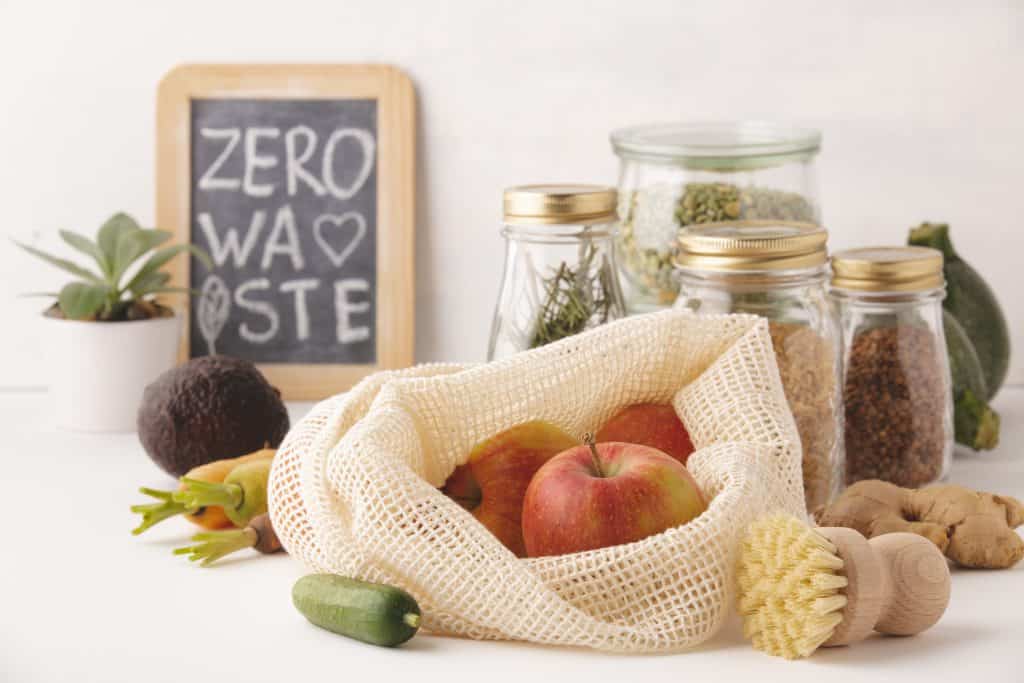
In This Article
Welcome to the exciting world of zero-waste living! If you’ve ever wondered how you can make a positive impact on the environment, reduce your carbon footprint, and simplify your life, then you’re in the right place. In this blog post, we’ll take you on a journey toward a more sustainable lifestyle—one that’s not just good for the planet, but for your well-being as well.
You’ve probably heard the term “zero-waste” before, but what exactly does it mean? Simply put, it’s a way of life where you strive to send as little trash to the landfill as possible. Instead of filling up your bins with disposable products and packaging, you’ll focus on reducing waste, reusing items, recycling responsibly, and even composting organic materials. The zero-waste lifestyle is a holistic approach to living that encourages conscious consumer choices and mindful resource use.
What Is Zero-Waste Living
To embark on this journey, you’ll need to grasp the core principles of zero-waste living. We like to call them the 5 R’s: Refuse, Reduce, Reuse, Recycle, and Rot. Let’s break them down:
- Refuse: This is your first line of defence. Refuse items that you don’t need, particularly single-use plastics and unnecessary packaging. By saying “no” to things you don’t require, you’re taking a significant step toward waste reduction.
- Reduce: Reduce your consumption. Cut down on items that have a short lifespan or those that can’t be recycled. This involves mindful shopping, planning, and making informed choices.
- Reuse: Instead of tossing items after a single use, opt for durable and reusable products. From water bottles and shopping bags to containers and cloth napkins, choosing reusable options can significantly cut down your waste.
- Recycle: When you can’t refuse, reduce, or reuse, recycling comes into play. Make sure you’re aware of your local recycling guidelines and recycle responsibly.
- Rot: Organic waste like food scraps and yard debris can be composted, creating nutrient-rich soil for gardening.
Now that you have a good grasp of what zero-waste living entails let’s move on to the practical side of things.
Getting Started with Zero-Waste Living
Getting started might seem a bit overwhelming, but remember that it’s not about achieving perfection from day one. It’s about making gradual, sustainable changes in your daily life. Here’s how to begin:
- Assess Your Current Waste Habits: Take a moment to evaluate your current lifestyle. How much waste do you produce daily or weekly? Understanding your baseline is crucial, as it allows you to track your progress and set achievable goals.
- Declutter and Simplify: One of the first steps is to declutter your life. Get rid of items you no longer need, use, or love. Simplifying your surroundings will make it easier to embrace a zero-waste lifestyle.
- Create a Personalized Zero-Waste Action Plan: The journey to zero-waste is unique for each person. Create a plan that suits your lifestyle, needs, and goals. Your action plan can include short-term and long-term objectives.
In the next sections, we’ll delve into strategies for reducing household waste, sustainable shopping habits, and DIY and upcycling tips to help you kick-start your zero-waste journey. So, keep reading to discover how you can make a positive change in your life and the world around you.
Strategies for Reducing Household Waste
Reducing household waste involves making conscious choices in various aspects of your life, from the kitchen to the bathroom and beyond. Let’s explore some strategies to help you minimize the trash that leaves your home.
- Reducing Food Waste: The kitchen is a great place to start your zero-waste journey. Meal planning, smart shopping, and portion control are effective ways to reduce food waste. By using up ingredients before they go bad and getting creative with leftovers, you’ll not only save money but also reduce your environmental impact.
- Minimizing Packaging Waste: Excessive packaging is a common source of waste. Buying in bulk and using reusable containers can significantly cut down on packaging waste. Also, make a conscious effort to avoid single-use plastics whenever possible.
- Choosing Durable and Sustainable Products: In your quest for a zero-waste lifestyle, it’s essential to invest in products that are built to last. Look for items that are made from eco-friendly materials and designed for longevity. Quality over quantity is the name of the game.
- Composting Organic Waste: Instead of throwing food scraps and yard debris into the trash, consider starting a composting system. Composting not only diverts organic waste from landfills but also creates nutrient-rich soil that can enhance your garden.
Sustainable Shopping Habits
Your shopping habits play a significant role in your zero-waste journey. Here are some eco-friendly shopping practices to help you minimize waste:
- Explore Local Farmers’ Markets and Bulk Stores: Local farmers’ markets often offer fresh, unpackaged produce, while bulk stores allow you to fill your containers with grains, nuts, and other items, reducing the need for disposable packaging.
- Use Reusable Bags, Containers, and Produce Bags: Carry reusable shopping bags, containers, and produce bags with you when you shop. This small change can have a substantial impact on reducing plastic waste.
- Support Brands with Eco-Friendly Packaging and Practices: Look for brands and products that prioritize eco-friendly packaging and sustainable manufacturing practices. Your purchasing power can influence positive change in the marketplace.
DIY and Upcycling
Embracing a zero-waste lifestyle can be an opportunity to tap into your creativity. DIY (Do It Yourself) and upcycling projects allow you to repurpose items and reduce waste. Here are some ideas to inspire your creative side:
- Encouraging Readers to Get Creative with DIY Projects: DIY projects can be fun, fulfilling, and environmentally friendly. Whether it’s making your cleaning products, crafting your home decor, or upcycling old furniture, there are countless ways to reduce waste through creativity.
- How to Repurpose and Upcycle Items: Upcycling involves taking something old and giving it new life. Learn how to repurpose old clothing, furniture, or household items. The possibilities are only limited by your imagination.
- Sharing Inspirational Examples of Upcycled Crafts and Home Decor: Showcasing real-life examples of upcycled projects can provide readers with inspiration and practical ideas for their zero-waste endeavours.
Reducing Energy and Water Waste
Making environmentally responsible choices goes beyond reducing physical waste. Reducing energy and water waste is another essential aspect of a sustainable lifestyle. Here are some tips to help you minimize your environmental footprint:
- Tips for Conserving Energy and Water in the Home: Simple changes, such as using energy-efficient lighting, turning off lights and appliances when not in use, and fixing leaks, can lead to significant energy and water savings.
- How to Make Your Home More Energy-Efficient: From insulating your home to upgrading to energy-efficient appliances, there are various ways to improve your home’s energy efficiency.
- Reducing Waste in Personal Care and Hygiene Products: Explore zero-waste personal care products, such as reusable cloth pads, menstrual cups, and refillable shampoo and soap bars. These choices reduce waste while maintaining your self-care routine.
Navigating Social Situations
Maintaining a zero-waste lifestyle isn’t limited to your home; it extends to social events and dining out. Here’s how to stay true to your commitment in various social situations:
- Tips for Maintaining Zero-Waste Habits When Dining Out or Attending Events: Learn how to politely decline single-use items and bring your reusable essentials when dining out or participating in events.
- Strategies for Explaining Your Lifestyle Choices to Friends and Family: Communicate your values and choices effectively to those around you. Encourage them to join you on your eco-friendly journey or, at the very least, respect your choices.
Coping with Zero-Waste Challenges
Embracing a zero-waste lifestyle can be both rewarding and challenging. It’s essential to address the psychological and emotional aspects of making these changes. Here are some strategies to help you navigate the challenges:
- Addressing the Psychological and Emotional Aspects: Acknowledge that making eco-conscious choices may sometimes feel overwhelming or inconvenient. It’s okay to experience these emotions and learn from them.
- Tips for Staying Motivated and Persistent: Find inspiration in your achievements, connect with like-minded individuals, and remember the bigger picture—your contribution to a healthier planet.
- Encouraging Self-Compassion and Recognizing That Perfection Is Not Necessary: No one is perfect, and the journey to zero waste doesn’t require perfection. Celebrate your efforts and learn from your experiences, whether they’re successful or not.
- Sharing Personal Anecdotes and Experiences: I’ve had my fair share of zero-waste challenges, and I’m excited to share some personal stories and experiences that highlight both the ups and downs of this lifestyle.
By now, you’ve covered a wide range of strategies and insights to minimize waste, reduce your environmental impact, and lead a more sustainable life. But the journey doesn’t stop here.
Conclusion
In closing, you’ve learned that zero-waste living is not an unattainable ideal but a journey that begins with small, mindful steps. By understanding the 5 R’s, assessing your current habits, and adopting sustainable practices, you can reduce your waste output, conserve resources, and make a positive impact on the environment.
Zero-waste living goes beyond minimizing your trash; it’s about making responsible choices in all aspects of your life, from energy and water consumption to personal care and shopping. And it doesn’t mean sacrificing convenience or enjoyment—rather, it can enhance your well-being and satisfaction.
You now have the tools to navigate social situations and overcome the challenges that may arise on your eco-conscious journey. Connect with like-minded individuals, access online resources, and seek inspiration from books and documentaries that align with your values.



